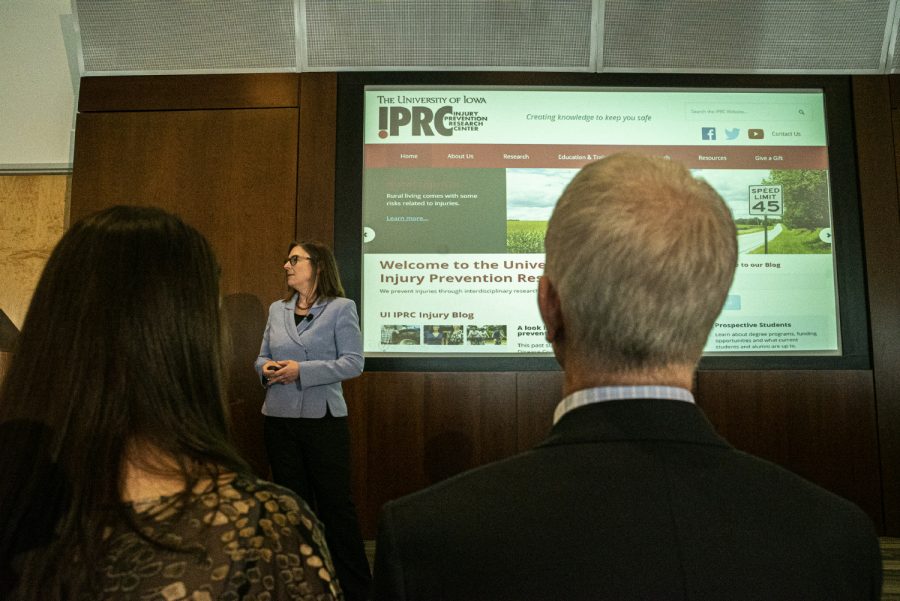UI professor addresses ‘epidemic of despair’ in 37th annual Presidential Lecture
In the 37th Presidential Lecture, UI professor Corinne Peek-Asa addressed a growing phenomenon she calls the “epidemic of despair.” This relates to substance abuse, overdoses, workplace suicides, and assaults tied to early childhood trauma.
University of Iowa occupational and environmental health professor Corinne Peek-Asa speaks at the 37th Annual Presidential Lecture in the Levitt Center on Sunday. Corinne delivered a lecture on Violence, Syndemics, and the Biology of Trauma.
February 16, 2020
Iowa is not immune to a growing national trend of despair from suicide, overdose, and alcohol abuse, according to University of Iowa Professor Corinne Peek-Asa.
At the 37th-annual Presidential Lecture on Sunday, entitled “Violence, Syndemics, and the Biology of Trauma,” Peek-Asa focused on what she dubbed the “epidemic of despair.” This included rising rates of suicide, overdose, and alcohol-involved diseases, and how each relates to early childhood trauma.
The Presidential Lecture Series began in 1987, UI President Bruce Harreld said at the event in the Levitt Center for University Advancement, and is designed to showcase ongoing work on campus and promote interdisciplinary learning.
“We’re all in the same community,” Harreld said. “It’s a pretty tight-knit community. And the issue of interdisciplinary collaboration, research, teaching, exploration is critical, I believe, to the future of the world.”
A key component of the “epidemic of despair” are Adverse Childhood Experiences, Peek-Asa said, which may organize the brain systems of young, developing minds.
“You can imagine if an infant or a young child is still in this period of really active brain development, their brain is going to organize around persistent stress as being the normal environment that they are in,” said Peek-Asa, associate dean for Research and Injury Prevention Research Center director. “And that’s going to affect every step of brain development all the way up to the final steps.”
Related: The 36th-annual presidential speech uncovers violence against women
An Adverse Childhood Experience may be abuse, neglect, or exposure to family and community trauma. According to research Peek-Asa presented, these experiences are tied to premature onset of all leading causes of death, and people who have six or more of these experiences have a life expectancy 20 years shorter than those without.
Another piece of the epidemic of despair, she said, is the idea that it is actually a syndemic — a cluster of epidemics.
“When we have a health burden that is related to a number of different types of risk factors that interact with each other and are tied to other health outcomes related to those same factors, we have a syndemic,” Peek-Asa said.
Such factors include violence, substance use, and communities with low reliance, or that have few preventions of interaction programs for Adverse Childhood Experiences. Peek-Asa highlighted a number of issues in her lecture related to the biology of trauma, including prison reform, workplace suicides, assaults, drug abuse, and gun control.
Harreld closed the event, stating that the current political climate makes it “high time” that people ask questions around key issues such as gun control, violence, and prison reform.
Related: E. Dale Abel delivers 35th Presidential Lecture
“There is legislation out there saying that if we take federal money, we can’t do research in a number of these areas,” Harreld said. “That’s got to stop so we can solve some of these problems.”
UI junior Marissa Mueller, a biomedical engineering student, expressed her enjoyment of the event and excitement for the interdisciplinary nature of Peek-Asa’s research.
“[Her research] affects everyone, everywhere,” Mueller said. “Every single one of these areas affects all of us on a daily basis. She really stressed the importance of research in this field because there is a huge need for more data… It gave a very big call to action.”





















